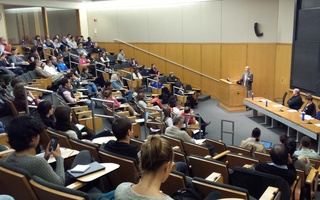{shortcode-97b41ddabfae930e64e0cffbb524f67e385a5f4e}
UPDATED: March 11, 2015, at 12:13 a.m.
Harvard University Dining Services has recently entered into a partnership to give up to 2,500 pounds of excess food from dining halls to local community organizations each week.
HUDS initiated the program with Food For Free, an organization started in 1981 dedicated to collecting food that would otherwise be left to waste and distributing it to shelters and pantries. The executive director of Food For Free, Sasha Purpura, set up a meeting with HUDS officials, and they found a way to safely give the extra food the University did not use.
“There are tremendous opportunities when we start working with Harvard,” Purpura said. “We realized just how healthy, nutritious meals are getting discarded everyday from all the universities and institutions just in our immediate area. Food For Free thinks it is an incredible opportunity for these institutions to do what Harvard is doing.”
Meredith L. Weenick, Harvard’s vice president of campus services, said the University was eager to participate.
“Every day, too many families and individuals are forced to make very difficult choices—choices between eating or paying rent or utility bills,” Weenick said in a press release. “Our partnership with Food For Free assures that any food we offer our students beyond what is utilized also serves our neighbors, so this really is a win-win for everyone involved.”
{shortcode-b43a02d0425d24e400218214cd8a748a7d5291ee}
Harvard and Food For Free launched a pilot of the program in Annenberg last summer. Now, the program has expanded to all dining halls. Food that falls under certain guidelines is frozen and bagged then given to Food For Free. No leftovers from students’ plates are donated.
The donated food goes to many organizations including the Cambridge Community Center and the Albany Street Center.
Through Harvard’s donation, the Cambridge Community Center has provided food to adults for events like community nights and to youth for after school programs, according to Darrin Korte, director of programs at Cambridge Community Center. In addition, Harvard has provided the center with two freezers in order to preserve the food from the deliveries.
Because of the food donations from Harvard, the Cambridge Community Center hopes to start up a new program this spring called “Coast Kitchen” in order to turn the food into meals for families to eat.
“We want to be able to get more families to be able to come and use our programs and resources,” Korte said. “One of the best ways to attract them is through food.”
—Staff writer Kay Lu can be reached at kay.lu@thecrimson.com.
—Staff writer Kamara A. Swaby can be reached at kamara.swaby@thecrimson.com. Follow her on Twitter @SwabyK.
Read more in College News
BGLTQ Student Life Office Launches QuNNECTRecommended Articles
-
The Prospect Union.The lecture tonight will be by Professor J. Royce of Harvard. The subject will be, "The Psychology of Invention." The
-
Boston Art Museum Free to StudentsBy a vote of the trustees free admission to the Boston Museum of Fine Arts is granted to instructors and
-
Final Sale of Class Day TicketsGraduates, undergraduates, Seniors, and members of the graduate schools may obtain Class Day tickets at the '77 Gate Lodge from
-
Senior Class NoticeTickets for the Senior Spread in Memorial Hall on June 16, and also Sanders Theatre, Stadium, Yard and Memorial dance
-
 Truckers, Farmers Banished to Oxford Street
Truckers, Farmers Banished to Oxford Street -
 'Food Better' Addresses Farmer, Buyer Disconnect
'Food Better' Addresses Farmer, Buyer Disconnect













